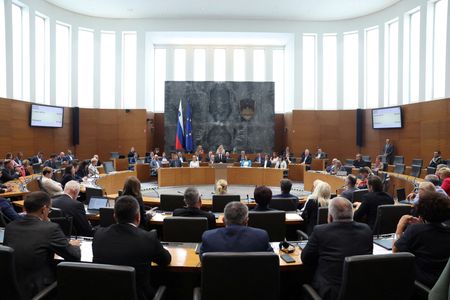By Patricia Zengerle
WASHINGTON (Reuters) – The U.S. House of Representatives voted on Thursday to sanction the International Criminal Court in protest at its arrest warrants for Israeli Prime Minister Benjamin Netanyahu and his former defense minister over Israel’s campaign in Gaza.
The vote was 243 to 140 in favor of the “Illegitimate Court Counteraction Act,” which would sanction any foreigner who investigates, arrests, detains or prosecutes U.S. citizens or those of an allied country, including Israel, who are not members of the court.
Forty-five Democrats joined 198 Republicans in backing the bill. No Republican voted against it.
“America is passing this law because a kangaroo court is seeking to arrest the prime minister of our great ally, Israel,” Representative Brian Mast, Republican chairman of the House Foreign Affairs Committee, said in a House speech before the vote.
The House vote, one of the first since the new Congress was seated last week, underscored strong support among President-elect Donald Trump’s fellow Republicans for Israel’s government, now that they control both chambers in Congress.
The ICC said it noted the bill with concern and warned it could rob victims of atrocities of justice and hope.
“The court firmly condemns any and all actions intended to threaten the court and its officials, undermine its judicial independence and its mandate and deprive millions of victims of international atrocities across the world of justice and hope,” it said in a statement sent to Reuters.
Trump’s first administration imposed sanctions on the ICC in 2020 in response to investigations into war crimes in Afghanistan, including allegations of torture by U.S. citizens.
Those sanctions were lifted by President Joe Biden’s administration, though Secretary of State Antony Blinken said in May last year that it was willing to work with Congress to potentially impose new sanctions on the ICC over the prosecutor’s request for arrest warrants for Israeli leaders.
Five years ago, then-ICC prosecutor Fatou Bensouda and other staff had credit cards and bank accounts frozen and U.S. travel impeded.
ICC watchers said the new sanctions would make it possible to target individuals assisting the work of the court.
“The bill is also broad because anyone who provides support to the court on any case exposes themselves to sanctions,” Milena Sterio, international law expert at Cleveland State University, told Reuters.
SANCTIONS COULD ‘JEOPARDIZE’ ICC, ITS PRESIDENT SAYS
In December, the court’s president, judge Tomoko Akane, told the ICC’s 125 member nations that “these measures would rapidly undermine the Court’s operations in all situations and cases and jeopardize its very existence”.
Trump will be sworn in on Jan. 20 for a second term as president.
The Senate’s newly appointed Republican majority leader, John Thune, has promised swift consideration of the sanctions act in his chamber so that Trump can sign it into law shortly after taking office.
The ICC is a permanent court that can prosecute individuals for war crimes, crimes against humanity, genocide and the crime of aggression in member states or by their nationals.
The court has said its decision to pursue warrants against the Israeli officials was in line with its approach in all cases, based on an assessment by the prosecutor that there was enough evidence to proceed, and the view that seeking arrest warrants immediately could prevent ongoing crimes.
Congressional Republicans have been denouncing the ICC since it issued arrest warrants for Netanyahu and his ex-defense chief Yoav Gallant, accusing them of war crimes and crimes against humanity in the 15-month-old Gaza conflict. Israel denies the allegations.
(Reporting by Patricia Zengerle; additional reporting by Anthony Deutsch and Stephanie van den Berg; editing by Bill Berkrot and Mark Heinrich)










